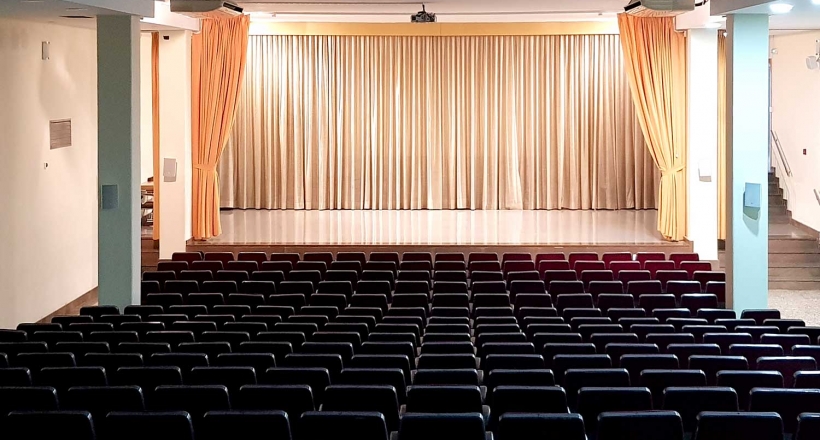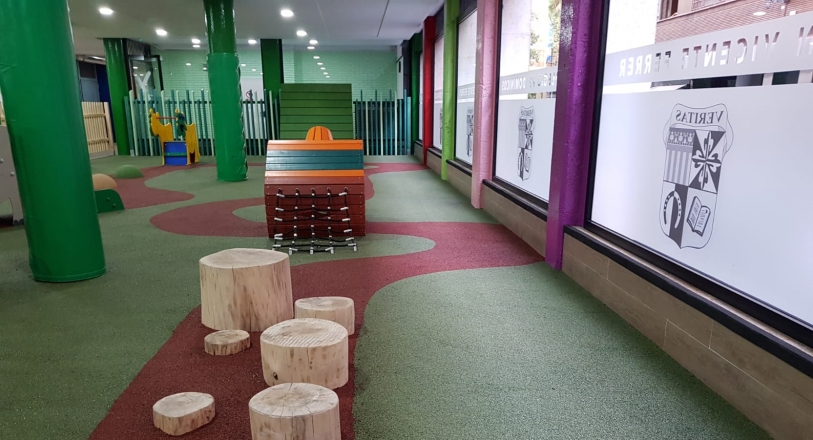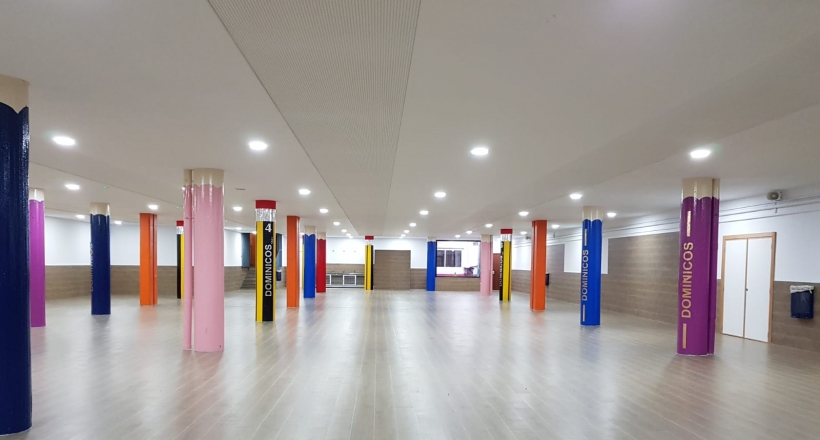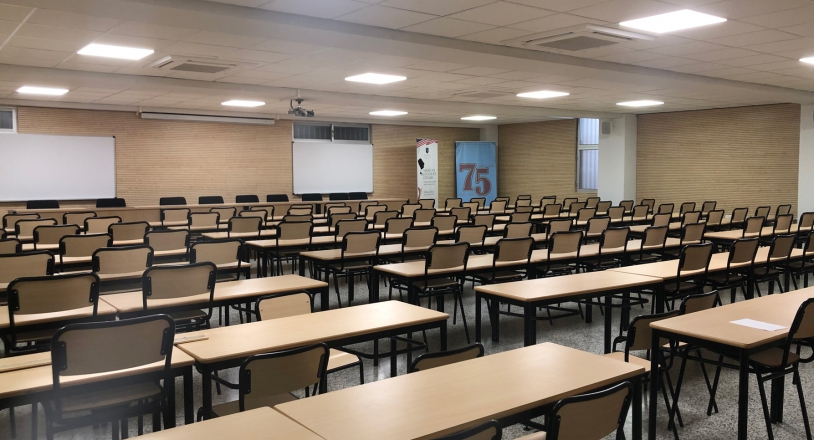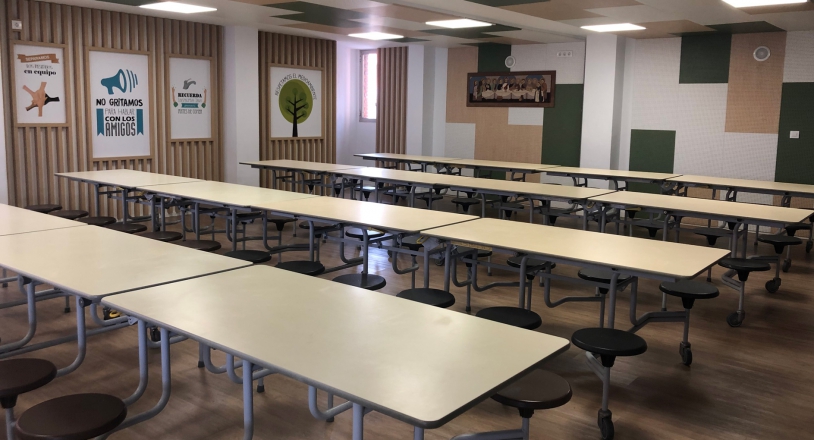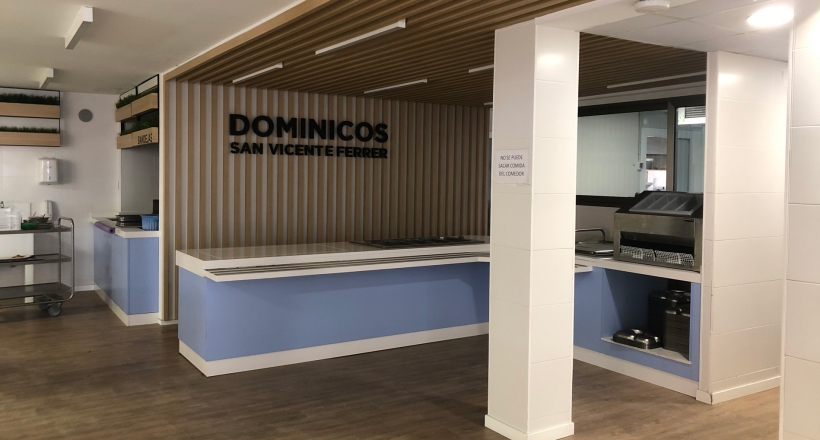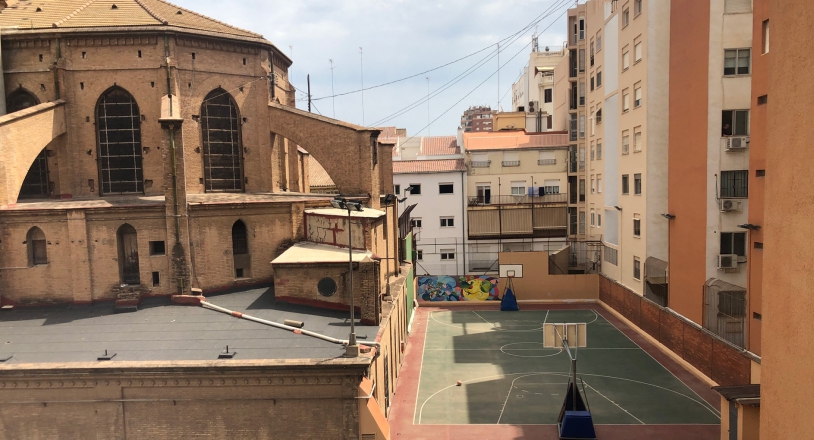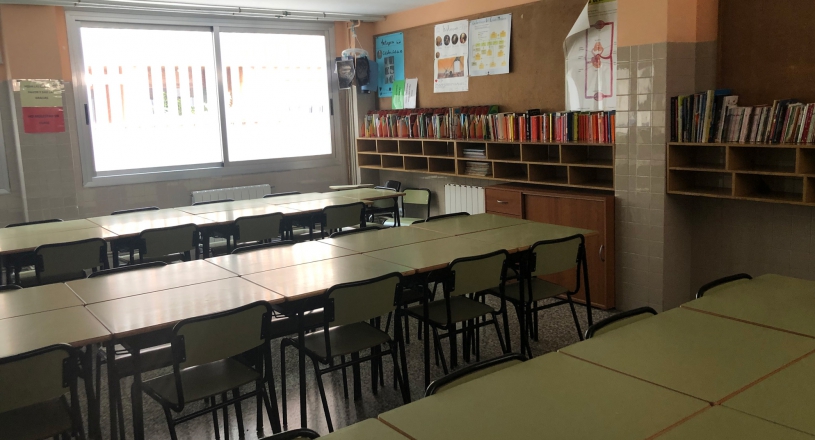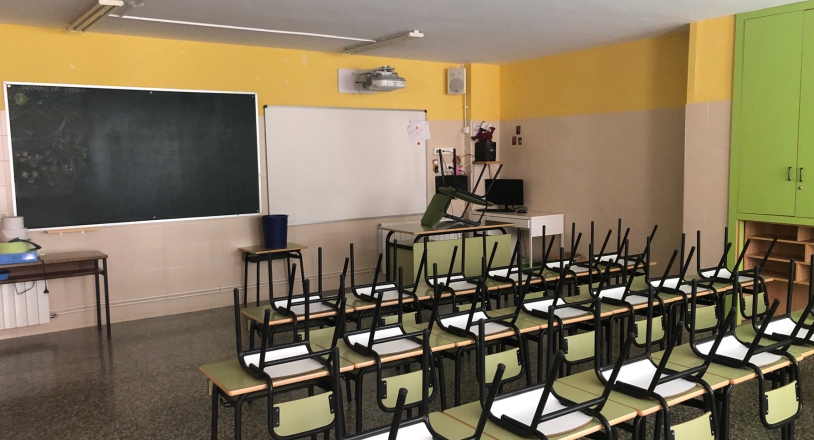Our school
THE CENTER
Welcome to the website of San Vicente Ferrer FESD - Valencia. This space is intended to be a window into the world through which the centre shares projects, activities, and concerns that showcase day to day life at our school. Our school, founded in 1941, has an extensive history as well as a vivacious future. We are always adapting to modern times in order to continue molding our students as citizens of the future, strengthening their abilities, and promoting their Christian identity.
We are a school that fosters personal relationships on a daily basis and unites teachers and students alike. Our diverse social programme promotes evangelical values such as hard work, acceptance, and gratitude, while relying on the proclamation of the Gospel and the Holy Family of Nazareth as reference points.
SANTO DOMINGO EDUCATIONAL FOUNDATION
A Project at the Service of Education
The Santo Domingo Educational Foundation is a Dominican Family Project in Spain that currently has 29 schools and 2 centres for Higher, Professional and Elementary Music Education. Together we form a large family of more than 20,000 students, 14,000 families and 1,800 educators at the service of a common project: to educate in the style of Santo Domingo de Guzmán.
IDEOLOGY
VALUES OF OUR CENTRE
The defining feature of our community is ideological diversity. This implies different concepts of man and, therefore, determines different educational objectives.
Coexistence in a diverse society requires both freedom to choose between various educational options and a clear definition of each option, to allow for authentic choice. Spanish law recognizes the diverse conditions within society as well as the freedom to choose an educational centre and the right of the latter to define its identity or character.
The Convent of San Vicente Ferrer, owner of the School San Vicente Ferrer-of the Dominican Fathers, in Valencia, accepts educational diversity, the principles that govern strong social tolerance, and the exercise of the right recognized by article 27 of the Constitution. This article, along with other supplementary provisions, protects the establishment of this educational centre.
This document will be presented to various members of the educational community so that all those involved in the educational process are aware of the framework in which their work is to be carried out.
EDUCATIONAL PROJECT
The Dominican pedagogy is based on 6 pillars of which our founder Santo Domingo de Guzman based his preaching.
SEARCHING FOR THE TRUTH
Saint Dominic was a "Seeker of Truth" in himself, in others, in his environment, and in the world. He understood truth as a light that reveals the beauty and goodness of God's world.
Skills: effort, ability, study, lifelong learning, entrepreneurship, critical thinking, honesty...
COMMUNITY
In our language today, we could say that Saint Dominic promoted a sense of community. From his perspective, the community itself is the first preacher, the practice of brotherhood, the best witness, and the first and most effective proclamation of the Gospel.
Skills: Co-responsibility, sharing, partnership, commitment, loyalty, teamwork, sense of common good...
COMPASSION
Saint Dominic, and other Christian leaders such as Friar Bartolome de las Casas, made contact with humanity an inexhaustible source of humanitarian and Christian practice. He had a refined sensitivity, understanding, and compassion for human weakness, especially for the poorest and most vulnerable.
Skills: Sensitivity, mercy, closeness, familiarity, solidarity, empathy, kindness...
CONTEMPLATION
"Contemplata aliis tradere". Silence, prayer, meditation and contemplation gave a special meaning to Saint Dominic's message and preaching.
Skills: reflection, silence, personal reflection, depth, interiority, management of emotions, attentive gaze...
SIMPLICITY
Dominican simplicity and humility invite the poorest and most outcast members of society to commit to evangelization. The simplicity of our presence is based on our relationship with the Universe and the integrity of Creation, where humanity is a privileged actor and therefore responsible for care and sustainability.
Skills: Humility, austerity, satisfaction, solidarity, ecology, proximity, empathy…
PREACHING
Dominican preachers are known for the phrase “a good life lived” meaning that that was your only job in life. Saint Dominic preached that women in particular were to spread the good news of the Gospel through dialogue and conversation. He believed that the spreading of the “Good News” was to be done through positive preaching and community preaching.
Skills: The gift of words, speech, sympathy, happiness/joy, celebrating, being positive, being hopeful...
ADMISSIONS
MANAGEMENT TEAM
HEADMASTER
P. Antonio Roy Laguens
dirgeneral.sanvicenteferrer@fesd.es
PEDAGOGICAL DIRECTOR OF KINDERGARTEN AND PRIMARY EDUCATION
Gorka Arrieta Pino
dpp.sanvicenteferrer@fesd.es
PEDAGOGICAL DIRECTOR OF SECONDARY EDUCATION AND BACHILLERATO-SIXTH FORM
Teresa Donderis Devís
dps.sanvicenteferrer@fesd.es
HEAD OF STUDIES FOR KINDERGARTEN AND PRIMARY EDUCATION
Sergio Rubio Sanjuanjep.sanvicenteferrer@fesd.es
HEAD OF STUDIES FOR SECONDARY EDUCATION AND BACHILLERATO-SIXTH FORM
Borja Padilla Roy
jes.sanvicenteferrer@fesd.es
RELIGIOUS EDUCATION COORDINATOR
P. Antonio Gómez Gamero
pastoral.sanvicenteferrer@fesd.es
Francisco Tolmo Alberca
f.tolmo.svf@fesd.es
SECRETARY AND ADMINISTRATION
SECRETARY’S OFFICE
The schools’ secretary’s office is in charge of:
- Manage and update academic records.
Carry out the admission process.
Managing the students’ registration, scholarships and grants, degree applications, academic certificates, university entrance exams, official language exams, etc.
Those managing this office are Eduardo Cañete and Emilio Araujo.
The opening hours will be:
- Appointment recommended.
- Monday to Thursday from 9:00 a.m. to 12:00 p.m.
- Wednesday from 15:30 to 16:30
- Appointment required:
- Friday
You can contact the office by email at secretaria.sanvicenteferrer@fesd.es and also by phone at 96 353 66 00.
ADMINISTRATION
The school’s administration is in charge of:
Management of bills and direct debits.
Cafeteria service.
Scholarships from the Ministry.
Certificates and other administrative procedures.
Those managing this office are Paco Tolmo and Verónica Martínez.
The opening hours will be:
- Appointment recommended.
- Monday to Thursday from 9:00 a.m. to 12:00 p.m.
- Wednesday from 15:30 to 16:30
- Appointment required:
- Friday
* During the months of June and July the opening hours will be Monday to Friday from 9:00 a.m. to 1:00 p.m.
You can contact us by email at admin.sanvicenteferrer@fesd.es and also by phone at 96 353 66 00.
FRONT DESK
Manolo Romero and Pedro González are in charge of the front desk.
Opening hours to the public (Monday to Friday):
Monday through Friday from 8:00 a.m. to 7:00 p.m.
Friday from 8:00 a.m. to 6:00 p.m.
You can contact us by phone at 96 353 66 00.
SCHOOL FACILITIES
HISTORY
The year 2016 was a year of celebration for the Dominicans and, in particular, for our school. It was the foundation's 800th anniversary (1216) of the Order of Preachers and the school’s 75th anniversary.
The school began as a project of Fr. Luis Urbano Lanaspa, a man of great talent, entrepreneurial spirit and creative ideas; taking advantage of the existing site on the Gran Via Marques del Turia, which was proposed to create a Centre of Higher Studies for ecclesiastes and secular people. Our educational centre was approved by the Council of the Province of Aragon on 3 March 1926 and by the Vicar General of the Order.
It was on 27 June of the same year, when the first stone was laid in the place that would later be occupied by the school's auditorium. Attending the ceremony were General Primo de Rivera, the Archbishop of Valencia, Don Prudencio Melo, who blessed the stone. The godparents of the ceremony, Don Rafael Pastor, the then Rector of the University and Doña Mercedes Martínez, Widow of Dado, the Provincial of the Dominicans of the Province of Aragon, who is now the Blessed P. Luis Urbano, and authorities who graced the event with their presence.
Years later, after the death of Father Urbano in 1936, the University Centre became the "Spanish-French School", so its seizure would be avoided during the war. When the war ended in 1939, two months later, Father Vicente Montserrat, born in Burgos, was appointed Prior Provincial of the Province of Aragon. He took over from Fr. Urbano in his initial idea for the educational centre in Valencia. There were talks about the management of the "Colegio Hispano-Franco". On 2 July 1941, 75 years ago today, the management was returned to the Dominicans.
Fr. Montserrat carried out a similar task in Zaragoza, where he also founded an educational centre and a University College, "Cardenal Xaviera". Nowadays, this university is still in operation and they celebrated its 75th anniversary.
Concerning the "Colegio Hispano-Franco", this institution had been recognised by the Ministry of National Education on 21 September 1939. Two years after the Dominicans took over, the General Director of Secondary Education, on 17 July 1943, authorised the name change. From that day on, the centre was called "Colegio Hispano de San Vicente Ferrer", until 5 December 1945. It was under the rectorship of Father Manuel Fortea, when it was ultimately renamed to "Colegio San Vicente Ferrer’’.
From 1941 to 1976, the centre was known as the Gran Vía School. Then the name changed to "Colegio Nuevo". This new school was located on Isabel la Católica Street, and it is where we are currently located. This transfer took place when Fr. José Martínez Cuesta was the Rector.
At present, our school has been operating under a mixed leadership since 1984, when Fr. Javier Laveaga was the Rector. Throughout these years, many Dominicans have gone through the centre. We must remember the dozens of teachers, men and women, who, along with the rest of the staff of the institution, contributed and continue to do so in the development of approximately 1100 students.
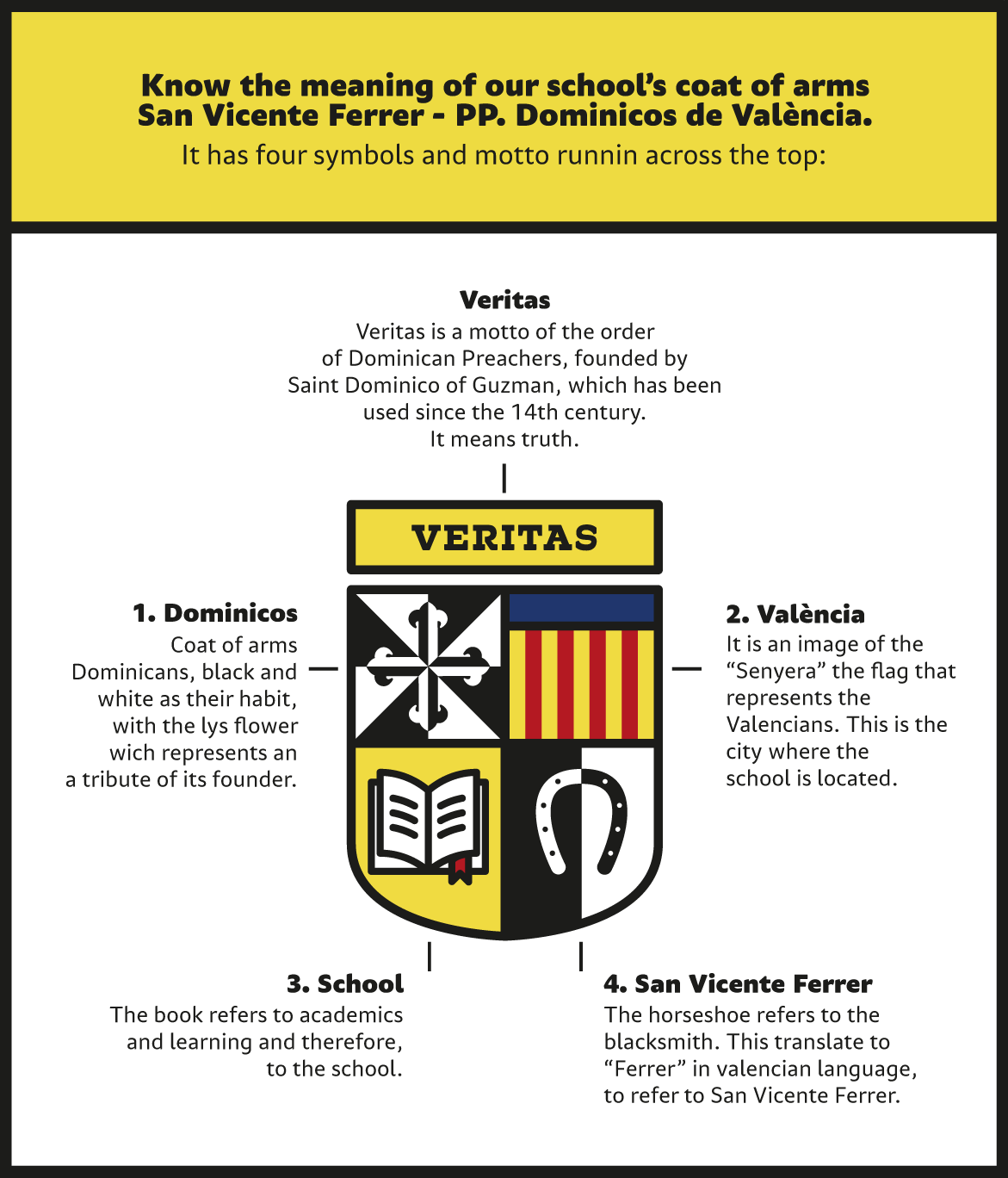
CHRONOLOGY






